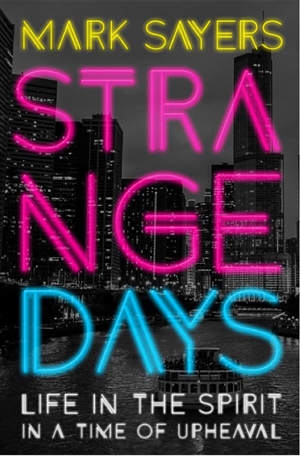
NILS VON KALM reads Mark Sayers’ latest book, Strange Days…
Mark Sayers
Strange Days: Life in the Spirit in a Time of Upheaval
Moody Publishers, 2017
ISBN-13: 978-0802415738

“Sayers has never been one for pat answers. This is no ‘Jesus is the answer and all your problems will be solved’ manual. Sayers is a much deeper thinker than that. By delving into what life in the Spirit might actually look like, Sayers shows us a model of living that might just free us from the anxiety that perpetually nags at our souls.”
Mark Sayers has a gift of speaking into 21st century Western culture in a way that makes Christian faith sensible. I share his passion for showing how Jesus is relevant to all of life.
Sayers’ latest book, Strange Days, is another helpful explanation of how to interpret these times we are living in. In these days when something you disagree with can be dismissed as ‘political correctness’ regardless of its moral quality, when fear of terrorism is at fever pitch, and when four out of five white evangelicals in the United States voted for a man they would never have touched if he was a Democrat, Sayers helps us sift through the craziness to come to a place of peace, love and trust in a God who is still good.
The thing I often find about Sayers’ insights is that he puts into words what many Christians are thinking. He has a knack of being able to articulate what we deep-down know to be true. In this way he cuts through any unnecessary baggage which may restrict us from seeing things as they are.
This book reminded me of Sayers’ first, The Trouble With Paris, in which he spoke about the hyper-reality we face in our constantly wired and connected culture. In Strange Days, Sayers continues this explanation of where we our culture is at.
An example he points out is in the changing way we receive information. Sayers explains how receiving information primarily via the internet is changing how we perceive information. The constant bits of information we receive become blurred into each other – we can be checking Facebook answering an invite to a party while scrolling past news of a terrible tragedy on the other side of the world. Horror is mixed with distraction and fun until we don’t know what is real anymore. Looking back, it wouldn’t surprise me if Sayers realises he was unwittingly foreseeing the current phenomenon of ‘fake news’ and ‘alternative facts’.
The most striking insight of this book was Sayers’ discussion of ‘places’ and ‘non-places’ and the subsequent loss of a sense of identity that this brings for many of us. He explains it as follows.
“Relationships, identity and history are three elements that contribute to the meaning-making function of ‘place’. Traditionally, in almost all human societies, individuals find meaning in the grid of relationships into which they are born and within which they exist throughout their life. This dense web of relationships gives one a sense of community and belonging. The cost of such a relational network is commitment; one is bound through loyalty to those around them, which ensures that the strength of community can continue to offer meaning and belonging.
“However, in contemporary Western culture, this dense web of relationships has slowly eroded, worn away by radical individualism, contemporary mobility, and an approach to relationships shaped by shopping and consumerism. We fear commitment and don’t want to be bound, preferring instead to travel relationally light. Thus we have more freedom, but the cost is a sense of lostness, isolation, and an absence of meaning. The non-place is defined by this light approach to relationships, built around individual freedom and movement.”
By describing our predicament this way, Sayers taps into the disease of the age that we are all afflicted with to some extent.
Strange Days highlights Sayers’ conviction that Jesus, or ‘life in the Spirit’, is what we are all searching for, whether we are aware of it or not. But Sayers has never been one for pat answers. This is no ‘Jesus is the answer and all your problems will be solved’ manual. Sayers is a much deeper thinker than that. By delving into what life in the Spirit might actually look like, Sayers shows us a model of living that might just free us from the anxiety that perpetually nags at our souls.
Ultimately, this is a realistic and, at the same time, hopeful, book. At times the writing is clunky and the editing comes across as having been rushed. This detracts somewhat from what Sayers is trying to discuss. But if the reader can leave that aside, this is a book worth getting into, even more than once, if you want to gain an informed understanding of these strange days we live in.





